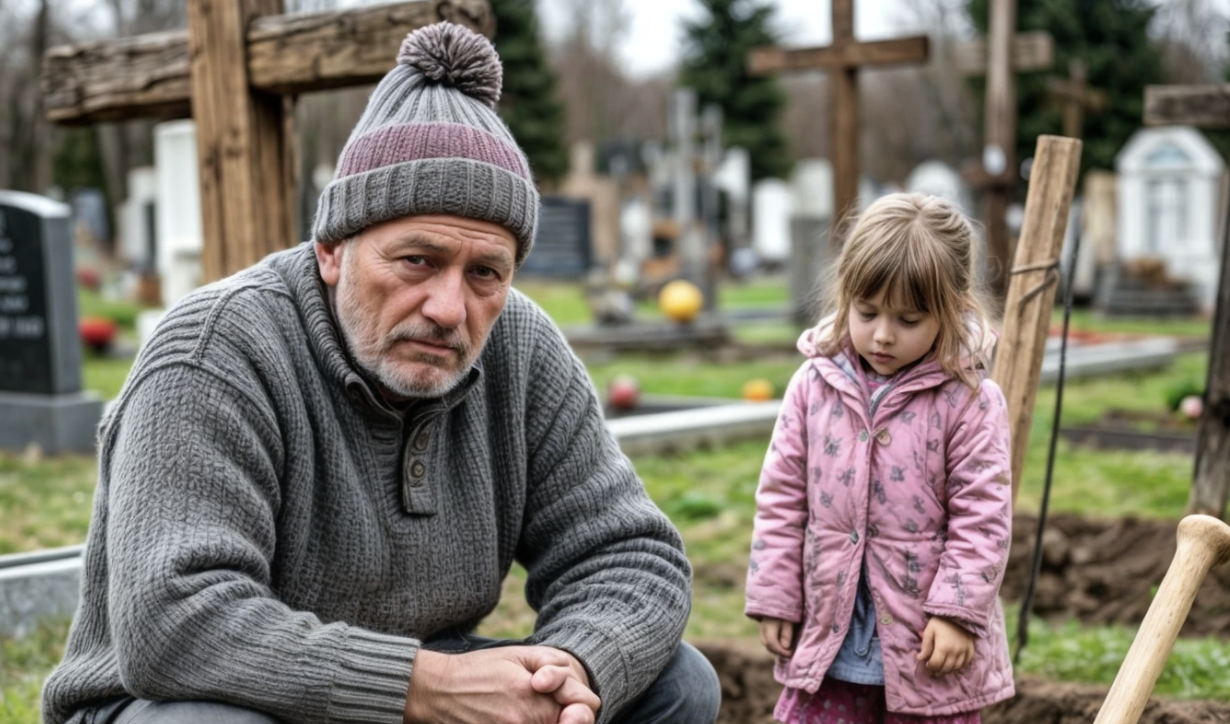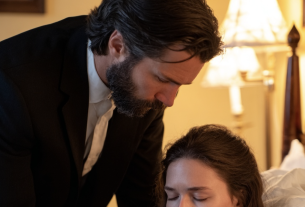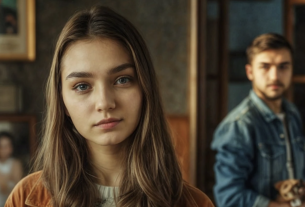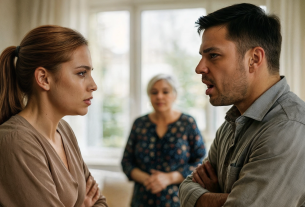Semyon Petrovich, or simply Petrovich — that’s what everyone who occasionally stopped by this forgotten-by-God place called him — with a strained groan plunged his shovel into the heavy, damp earth. Another day, like hundreds before. He had been working here, at the old village cemetery, for twenty years now, ever since the noisy and cruel city spat him out to the outskirts of life.
Here, among graves and crosses, there was silence. There was no pretense. Petrovich often grumbled about modern times — about young people absorbed in their smartphone screens, about how people had forgotten how to truly feel and mourn. But he did it without bitterness, rather with a tired understanding: the world changes, but he stayed in his place. He had long gotten used to loneliness, to the smell of damp earth, to the weight of honest labor that made his whole body ache but kept his soul calm.
“Grandpa Petrovich!” — a voice rang out, clear as a bell, scattering the old man’s thoughts.
Across the hummocks, lightly and carefree, ran a girl of about eight — thin, with sharp shoulders, wearing worn sandals and a faded calico dress. Alyonka. His little guest, almost like family. To this place, she was as natural an element as the ancient crosses and silent crows on the birches.
“Here you are again, my little bird,” rumbled Petrovich, leaning his shovel against a mound. He wiped his hands on his trousers and rummaged through his battered bag. “Hungry, I bet?”
He handed her a sandwich wrapped in old newspaper. The girl took it with both hands as if it were a treasure and immediately began eating hurriedly, not hiding her joy. Her cheeks moved quickly, and Petrovich couldn’t help but smile.
“Just slow down or you’ll choke,” he scolded, though his voice held only care. He knew where Alyonka lived, and his heart ached with sympathy.
When the food was gone, the girl lifted her big, too-serious eyes to him.
“Grandpa Petrovich… Can I spend the night at your place today?” she whispered, fiddling with the hem of her dress. “Mom… is going to marry again.”
Petrovich understood without explanation. “Marry” for them meant drunkenness, noise, men, strange looks, danger. And also bruises, which he had seen on Alyonka’s arms a couple of months ago. Then he had come to their house, flung open the door, and just by his presence silenced everyone. But he knew — it was temporary.
“Of course you can, little bird,” he sighed. “Come on, it’s getting dark soon.”
The next day Petrovich dug a new grave — for a young woman. She had drowned in an expensive car outside the city. The relatives who came were strangers, cold, clearly thinking more about the inheritance than the deceased.
He worked and thought about the injustice of the world. Money, beauty, youth — yet no one stood by the coffin, no one shed a true tear. Just fuss and greed.
Alyonka sat nearby on a bench, swinging her legs. She had already become part of this place, like a small shadow.
“Grandpa, who died?” she asked.
“A young woman,” he replied without turning.
“Do you feel sorry for her?”
“All the dead deserve pity, Alyonka. They can’t change anything anymore.”
He straightened up, leaning on his shovel. The pit was ready — deep and even. The work was done.
“Let’s go warm up with some tea,” he invited. “You’re probably freezing.”
The girl ran to him and trustingly grabbed his calloused hand with her small palm. That simple touch made him feel warmer inside. And the tiny guardhouse, smelling of old herbs and smoke, was the most reliable place on earth for Alyonka.
In the morning, the hearse arrived. A black car stopped by the fresh grave. Two men in strict suits got out, carried out the lacquered coffin, and placed it on stools at the edge of the pit.
“Hurry up, we’ve got things to do,” one of them told Petrovich.
The old man frowned. He disliked this fuss. One should stand, be silent, say goodbye properly.
“It can wait,” he answered sharply. “This is not firewood. It should be done properly.”
The men shrugged, got back in the car, and left, promising to return in an hour. Petrovich was left alone — with the coffin, with silence, and with the last hour of peace for the one who shouldn’t lose it.
He sat on the bench, smoking his hand-rolled cigarette, staring at the coffin. At that moment, Alyonka silently slipped out of the guardhouse. She crept to the grave, squatted, and looked inside. On the white satin lay a beautiful woman with a waxy face. It seemed she was just sleeping. Alyonka looked for a long time, then turned to Petrovich and quietly asked:
“Grandpa, you’re not seriously going to bury her, are you?”
Her words hit his chest so hard he caught his breath. Petrovich coughed, put out the cigarette. He wanted to shoo the girl away, tell her not to look, but he couldn’t. Something in her eyes, in her certainty that everything around was a game, stopped him. He found no words.
“Go on, Alyonka, you don’t belong here,” he croaked, approaching the coffin.
He had to close the lid. He reached for it, but suddenly his fingers touched the woman’s skin. Cold, but not completely. Not like the dead. His heart froze. He pressed his fingers again to her neck, to the carotid artery. One second… another… Beneath the skin, barely noticeable, but beating — a pulse. Alive!
Petrovich stepped back as if he had been burned. Thoughts raced. He remembered an old case when doctors made a mistake and a person awoke in the morgue. A lethargic sleep. If not for Alyonka, if not for her question, he would have done something terrible.
His hands trembled as he dialed the ambulance number. When the doctors, puzzled, took the woman away, Alyonka ran up to him and looked up with childish delight:
“Grandpa, you saved a person! You’re a magician!”
Petrovich sank onto the bench and pulled the girl close.
“It was you who saved her, little bird,” he said quietly, stroking her head. “Only you. Without you, I would have carried such a sin on my soul I would never have forgiven.”
A month passed. Life at the cemetery returned to its usual course. Petrovich dug graves as before, and Alyonka spent every day with him. Summer slowly faded into the past, and the old man increasingly thought about school. He carefully set aside every coin from his meager salary, planning to go to the city — to buy the girl notebooks, pens, a schoolbag, maybe even something warm for autumn.
That day he was counting his pathetic savings when someone knocked on the guardhouse door. Petrovich was surprised — visitors came rarely. Opening the door, he froze. Standing on the threshold was a woman in an expensive coat, with neat hair and a warm smile. Something about her face seemed familiar, but he couldn’t recall.
“Don’t you recognize me?” she asked softly, and her eyes sparkled with playful light. “The deceased, no less.”
Petrovich was breathless. There she was — the very woman he had almost buried. Now she was alive, healthy, with rosy cheeks and bright, shining eyes. Marina.
“You… how…” was all he could manage.
“Like this. Thank you. And your little granddaughter.”
“She’s not my granddaughter,” muttered Petrovich, letting her in.
He brewed tea, took out two cracked mugs. Marina sat on the wooden bench, looking around with interest. They talked for a long time. She told how distant relatives, wanting the inheritance, bribed a doctor who gave her a drug that caused a state resembling clinical death. Everything was planned down to the smallest detail. But chance — or fate — intervened. A criminal case was opened against them. Petrovich, in turn, told about his lonely life and how Alyonka had become the most important person to him.
In the middle of the conversation, the door flew open and the girl herself peeked into the guardhouse. Seeing the stranger, she froze at the threshold, shy and cautious.
“And here’s my second savior,” Marina smiled, looking at Alyonka with gratitude and warmth.
Learning they were going to the city for school supplies, Marina decisively declared:
“No buses. I will drive you. And don’t argue, Semyon Petrovich — that’s the least I can do.”
Petrovich chuckled but did not object. Half an hour later, they were already riding in Marina’s brand-new car. For Alyonka, it was a real celebration — she pressed to the window, eyes glued to the flying trees and houses.
In the city, Marina took them to a large children’s store. She moved between the aisles like a fairy, and soon Alyonka had gathered more clothes than she had ever owned: dresses, jeans, shoes, sneakers, a warm jacket, and the most beautiful butterfly-patterned schoolbag. Petrovich stood aside, embarrassed, but seeing the girl’s shining eyes, he knew it was worth it.
After shopping, Marina took them to a café. Alyonka had never been to such a place. She sat upright like a stick, in her new blue dress, reverently eating ice cream with chocolate and berries, trying not to drop a single drop.
“So, beauty, what school are you going to?” Marina asked.
And then Petrovich felt a chill. He had completely forgotten about one important matter.
“Documents…” he muttered. “I didn’t even think about the documents.”
All three understood: Alyonka’s mother was unlikely to bother with registration. And the new things might soon be exchanged for vodka. The joy of the day was overshadowed by worry about the girl’s future.
That night Marina couldn’t sleep. Lying in her spacious but empty apartment, she thought about herself. She had money, a career, but no one who would love her sincerely and mourn if she were gone. That story at the cemetery — it was no coincidence. It was a chance to start over, to fill life with meaning.
In the morning she made a decision. She went to Alyonka’s mother. The condition in the house was worse than she expected: dirt, the smell of alcohol, empty bottles. The woman greeted her suspiciously.
“What do you want?”
“I need Alyonka’s documents.”
“Give me money — then we’ll talk.”
Marina silently placed a wad of bills on the table. The woman’s eyes lit up. She pulled a folder with papers from the dresser and handed it over. The deal was done. Marina left without looking back. She knew — she would not let this girl disappear into such a life. She would take responsibility for her.
The long process of guardianship registration began. Marina hired the best lawyers, went to offices, proved she could be a good mother. Alyonka’s things were kept by Petrovich — as a symbol of hope for the better.
On September 1, Marina came to the cemetery. She looked exhausted but happy.
“That’s it, Semyon Petrovich,” she said. “I got guardianship. Tomorrow I’m taking Alyonka with me.”
Petrovich froze. He was happy for the girl with all his heart, but the thought that he would no longer see her or hear her voice squeezed his heart. His world, so familiar and settled, suddenly emptied. He silently looked at Marina, speechless.
She understood his pain, sighed, and gently offered:
“Come with me, Semyon Petrovich. See where our Alyonka will live.”
He agreed. They arrived at a large, bright house outside the city. Marina showed the girl’s room — cozy, with white furniture and toys. Then opened the door to the next room. There was a bed, an armchair, and a bookshelf.
“This is for you, Semyon Petrovich,” she said quietly. “What kind of house is it without a grandfather? Alyonka needs a grandfather — a real one. And I need a family too. Move in with us.”
Petrovich looked at her, tears running down his face. He, an old gravedigger who had lived his whole life alone, suddenly gained a home, a family, warmth. He silently nodded.
The next morning the three of them walked to the school ceremony. Alyonka — in her new uniform, with white bows, shining. Marina — elegant, confident. Petrovich — in a new suit, proudly straightening his back, rejuvenated as if time had turned back.
Holding the girl’s hands, they entered the schoolyard filled with well-dressed children and anxious parents. Petrovich leaned toward Marina and whispered:
“Look, ours… is the most beautiful of all.”



